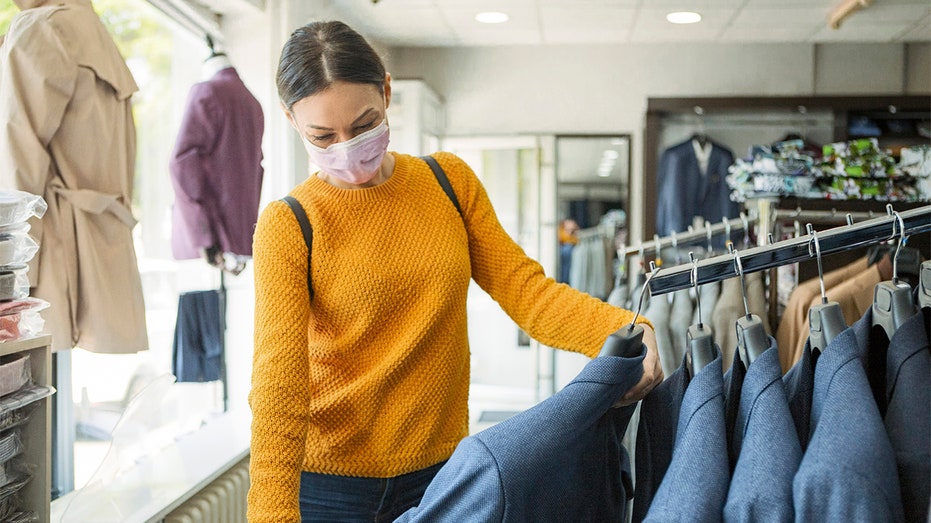Apparel brands push more-stylish dressing at home
Brands like Ann Taylor, Banana Republic and Express have organized online categories around working or staying at home
Business-casual retailers are trying to figure out how to entice Americans who have grown used to T-shirts, leggings and gym shorts to buy their blazers, maxi dresses and fancier pants.
Brands like Ann Taylor, Banana Republic and Express have organized online categories around working or staying at home, hoping to keep selling their signature work apparel during the pandemic. But the coronavirus lockdowns have only furthered America's embrace of informal attire, retail executives say.
"We've been seeing a shift to more casual wardrobes for decades, quite honestly, in America," Express Inc. Chief Executive Timothy Baxter said on the company's earnings call last month. "And I think there is no doubt that this pandemic has pushed that forward even more significantly and even more rapidly."
LOUNGEWEAR TRUMPS PAJAMAS IN CORONAVIRUS QUARANTINE FASHION
Express markets a "ways to work" section on its website with the attire grouped by style: back-to-office, work-from-home and interview. The work-from-home category lists blazers and trendy ankle pants, along with casual tees, sweaters and scented candles. Mr. Baxter said the company "saw strength in casual categories such as leggings and jogger pants, driven partly by our new work-from-home and essential shops."
Ashley Goldsmith, a San Francisco-based content strategist for Facebook Inc., bought more casual items to wear during the pandemic, including workout pants, leggings and two robes. While she shopped for comfort wear, she said she noticed the attempts by sellers to push dressier options.

(iStock)
"I get it and I don't blame them for doing it," Ms. Goldsmith said. "They probably have to do a little bit more convincing" to sell a stylish top to someone who doesn't need to be lured into wearing sweatpants, she said.
LOUNGEWEAR SALES SOAR IN CORONAVIRUS QUARANTINE
Gap Inc.'s sales fell 43% in the latest quarter, weighed down in part by its Banana Republic brand, which is more oriented toward business attire. The brand's sales fell 47%, compared with an 8% drop for Gap's athleisure-wear brand Athleta.
"In this crisis, with the unforeseen shift to consumers working from home, Banana Republic was disadvantaged in its product mix as customers opted for casual style," Gap Chief Executive Sonia Syngal said on the company's earnings call. The brand's workwear category underperformed in the quarter, she said, while it was lacking inventory of more-casual items.
Gap's research has found that nearly a third of Banana Republic customers are dressing businesslike up top, a spokeswoman said in an email. Banana Republic's men's polos category has been trending along with women's accessories, such as jewelry "for those looking for a little 'sparkle' for a virtual meeting," the spokeswoman said.
US RETAIL SALES SOAR 17.7%, BIGGEST MONTHLY INCREASE EVER
Capri Holdings Ltd., the parent of high-end shoe company Jimmy Choo, is concerned about the dress-shoe business, Chief Executive John Idol said on the company's earnings call earlier this week. Revenue at Jimmy Choo fell 23% in the latest quarter.
"We're going to have to move a little faster on our casual initiatives" for the brand, Mr. Idol said.
BJ Bueno, founder of retail consultant Cult Branding Co., said companies can excite consumers about a product but generally they won't buy it if they don't need it. Now, for example, a company selling beautiful suitcases is out of luck because people aren't traveling.
"You could offer it, but you're just not going to move it," he said.
Not everyone, however, is buying for today. Madeleine Fish, a clinical research coordinator in Boston, said she has been wearing more casual clothes at home like sweatpants, but she is also looking ahead. She bought a maxi skirt, some patterned shorts and accessories, plus a new pair of joggers from Athleta.
GET FOX BUSINESS ON THE GO BY CLICKING HERE
"If I want to feel more productive, I'll put on some of the new stuff," she said.
Mr. Baxter, Express's CEO, said the company was at a disadvantage because the company compared with its peers is stronger in more-formal clothing, but said he doesn't think fancy-clothing occasions "are gone for good." Sales in the first quarter fell by 53%.
"The long-term impact on the way consumers will dress is still to be understood and written," he said. "I think we're still evolving."
CLICK HERE TO READ MORE ON FOX BUSINESS




















